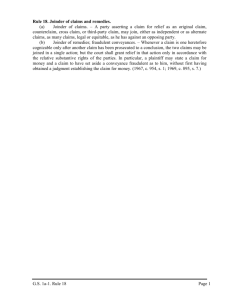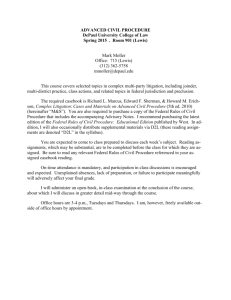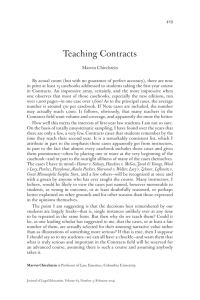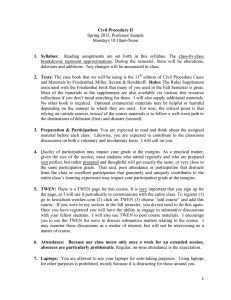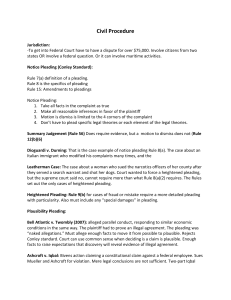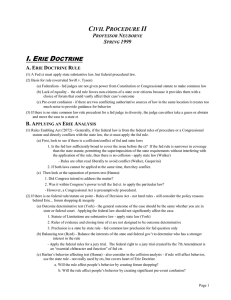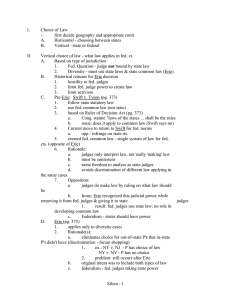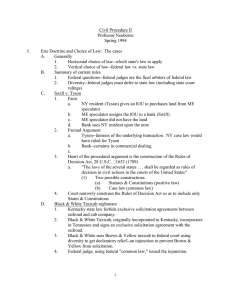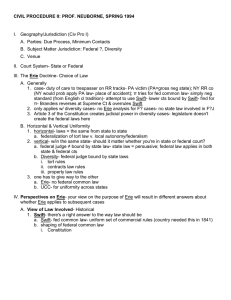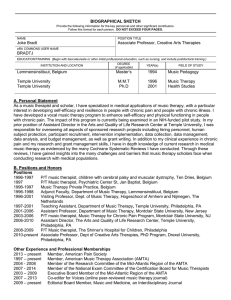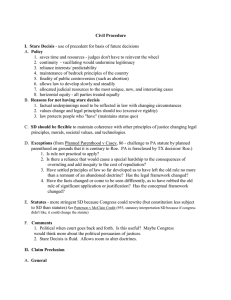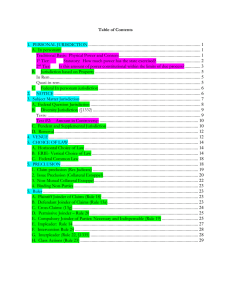CIVIL PROCEDURE
advertisement
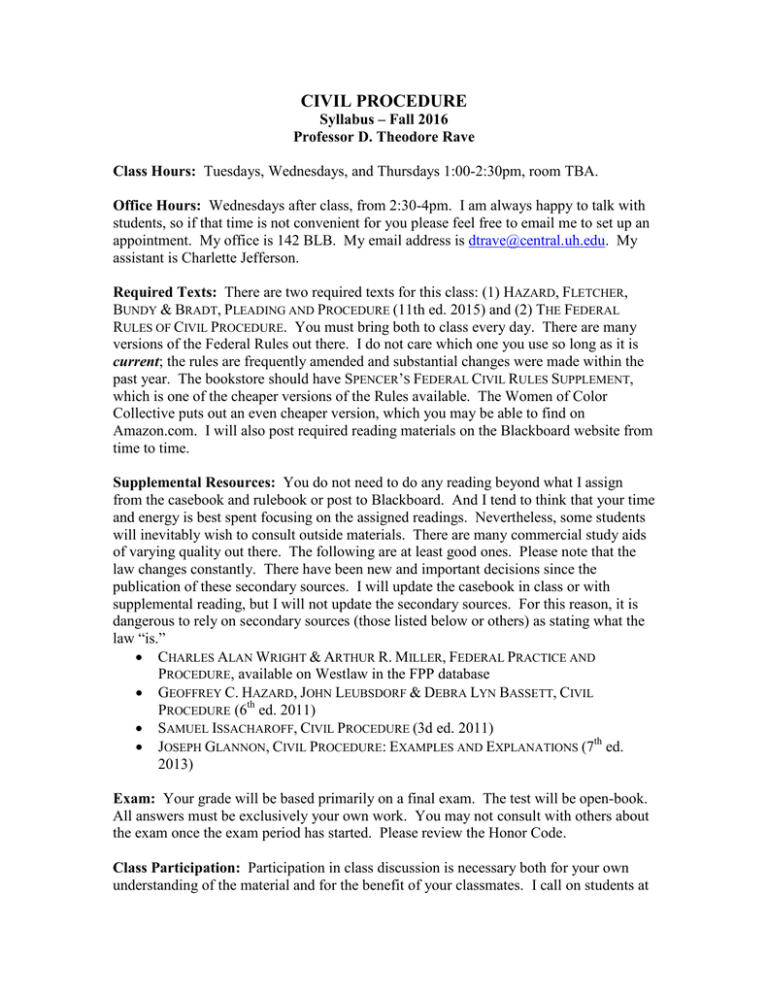
CIVIL PROCEDURE Syllabus – Fall 2016 Professor D. Theodore Rave Class Hours: Tuesdays, Wednesdays, and Thursdays 1:00-2:30pm, room TBA. Office Hours: Wednesdays after class, from 2:30-4pm. I am always happy to talk with students, so if that time is not convenient for you please feel free to email me to set up an appointment. My office is 142 BLB. My email address is dtrave@central.uh.edu. My assistant is Charlette Jefferson. Required Texts: There are two required texts for this class: (1) HAZARD, FLETCHER, BUNDY & BRADT, PLEADING AND PROCEDURE (11th ed. 2015) and (2) THE FEDERAL RULES OF CIVIL PROCEDURE. You must bring both to class every day. There are many versions of the Federal Rules out there. I do not care which one you use so long as it is current; the rules are frequently amended and substantial changes were made within the past year. The bookstore should have SPENCER’S FEDERAL CIVIL RULES SUPPLEMENT, which is one of the cheaper versions of the Rules available. The Women of Color Collective puts out an even cheaper version, which you may be able to find on Amazon.com. I will also post required reading materials on the Blackboard website from time to time. Supplemental Resources: You do not need to do any reading beyond what I assign from the casebook and rulebook or post to Blackboard. And I tend to think that your time and energy is best spent focusing on the assigned readings. Nevertheless, some students will inevitably wish to consult outside materials. There are many commercial study aids of varying quality out there. The following are at least good ones. Please note that the law changes constantly. There have been new and important decisions since the publication of these secondary sources. I will update the casebook in class or with supplemental reading, but I will not update the secondary sources. For this reason, it is dangerous to rely on secondary sources (those listed below or others) as stating what the law “is.” • CHARLES ALAN WRIGHT & ARTHUR R. MILLER, FEDERAL PRACTICE AND PROCEDURE, available on Westlaw in the FPP database • GEOFFREY C. HAZARD, JOHN LEUBSDORF & DEBRA LYN BASSETT, CIVIL PROCEDURE (6th ed. 2011) • SAMUEL ISSACHAROFF, CIVIL PROCEDURE (3d ed. 2011) • JOSEPH GLANNON, CIVIL PROCEDURE: EXAMPLES AND EXPLANATIONS (7th ed. 2013) Exam: Your grade will be based primarily on a final exam. The test will be open-book. All answers must be exclusively your own work. You may not consult with others about the exam once the exam period has started. Please review the Honor Code. Class Participation: Participation in class discussion is necessary both for your own understanding of the material and for the benefit of your classmates. I call on students at each class meeting to contribute to our discussion of the material. I expect you to be prepared for every class. If, for any reason, you are not prepared for a class I ask that you let me know in advance (either by email or by leaving a note on the lectern in class) and I will not call on you that day. If you are unprepared more than twice during the semester, it will affect your grade. Final grades may be modified up or down by one level (e.g., B+ to A- or A- to B+) based on class participation. Practice Problems: There will be several practice problems throughout the semester. You will be required to complete and turn in answers. These will not be graded, but will count towards class participation. Students that make a good faith effort to complete the practice problems will satisfy this requirement for class participation purposes. Please keep in mind that your final grade can be modified up or down for class participation. Attendance: You are expected to attend all class sessions. If you fail to attend at least 80% of class meetings you will be in violation of ABA and Law Center policy and may be dropped from the course. I will keep track of attendance by passing around a sign-in sheet. It is an honor code violation to sign in for another student. Late arrivals may be treated as absences. Computer Policy: Use of laptops or other electronic devices is permitted for classrelated purposes only. Violations of this policy will be treated as unpreparedness. Recordings and Attribution: I find that class discussion is most productive when students feel free to try out positions with which they (or others) may not agree and to test the assumptions underlying their own (or others’) views. For this reason, class discussion is strictly “off the record.” Outside of the classroom, you may not attribute any statements made in class to any of your classmates. And any audio or visual recording of class is prohibited. They only exception to this policy is that I will arrange for the law school to record any make-up classes that might become necessary. Accommodation: If you have a disability and require an accommodation, please contact the Center for Students with Disabilities. Reading Assignments: Reading assignments will be announced in class or emailed to all class members. I will provide you with a course outline and reading assignments in installments as the semester goes on. Unless otherwise noted, page numbers refer to the Hazard, Fletcher, Bundy & Bradt casebook. FCRP refers to the Federal Rules of Civil Procedure. (BB) refers to supplemental readings posted on Blackboard. First Assignment: TBD. Tentative Course Outline I. Introduction to the Civil Justice System II. Choosing the Proper Court A. Territorial (Personal) Jurisdiction B. Subject Matter Jurisdiction C. Non-Constitutional Constraints: Venue and Forum Non Conveniens III. What Law Applies? A. The Governing Law in the Federal Courts B. Transfer, Choice of Law, and Erie IV. Pleading A. Sufficiency of the Complaint B. Ethical Constraints on Pleading C. Responding to and Amending Pleadings V. Joinder A. Claim Joinder, Counterclaims, and Cross-claims B. Party Joinder C. Impleader VI. Discovery A. Tools B. Discovery Exercise (BB) C. Privilege VII. Ending a Lawsuit Without Trial A. Summary Judgment VIII. Trial, Juries, and Jury Control IX. Preclusion A. Claim Preclusion B. Issue Preclusion C. Preclusion and New Parties X. Class Actions
